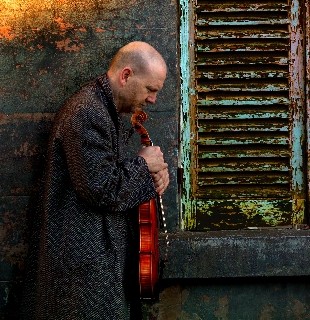Brett Dean’s “Epitaphs,” a superb addition to the quintet repertoire

Composer Brett Dean's string quintet, "Epitaphs," received its American premiere Sunday night at the Santa Fe Chamber Music Festival
Brett Dean is not a composer lacking in performances with the Australian’s music seemingly everywhere and in abundance. Last season Chicago’s Callisto Ensemble performed a Dean work on each of its programs.
The program presented Sunday evening at the ever-adventurous Santa Fe Chamber Music Festival offered the American premiere of Brett Dean’s Epitaphs for string quintet, a work co-commissioned by the festival. The Orion String Quartet were the performers with composer Dean taking the second viola part.
The music of the Australian violist-composer is immediately compelling, combining thorny modernism with sudden fleeting and often quite affecting snatches of post-Romantic lyricism.
In the program note, Dean states that he has long been fascinated by the quintet form, and the great works of Mozart, Schubert and Brahms. The deaths of several of Dean’s close friends and colleagues in 2008-2009 led to his structuring this work in five movements with each work inspired by one or more of the departed.
Yet the result is anything but funereal. The first movement (dedicated to Australian poet, Dorothy Porter) is cast in Dean’s most astringent style, with mechanistic high harmonics like a ticking clock that segues into a brooding cello solo. The second movement combines elegiac music with screaming Bartokian passages, ending in an acidy emphatic tutti.
Next comes a homage to Dean’s cellist friend (and former Berlin Philharmonic colleague) Jan Diesselhorst. Aptly, the movement consists of a long, searching cello solo—beautifully played by the Orion’s Timothy Eddy—that moves into a more angular passage as the other instruments join in, ending with quiet, rustling like the wind in a graveyard.
The fourth movement (jointly dedicated to Hungarian composer Gyorgy Ligeti and American arts patron Betty Freeman), is very fast and intensely contrapuntal, with some Ligeti-like pitch-bending. The final section (for Richard Hickox, British conductor) is the most valedictory in expression with a reflective delicacy that leads to an aggressive driving middle section, and a return to the elegiac opening.
Brett Dean’s Epitaphs is an individual and expressive work, with considerable technnical challenges, but makes a superb and welcome modern addition to the string quintet repertoire. The violist-composer and Orion members were warmly applauded for their efforts.
The concert led off with the chamber group Opus One in Beethoven’s early Piano Quartet. Though his Op. 16 was clearly inspired by Mozart’s pioneering work for the same forces, the result is equal parts proto-Haydn bonhomie and some not-too-dramatic working out of his ideas.
Considering the celebrated names in this ensemble, the performance was a mixed affair at best, and sounded like it could have used more rehearsal time. Anne-Marie McDermott provided graceful and sparkling keyboard work, neither inflating the scale nor neglecting the quicksilver wit, and cellist Peter Wiley was in synch with the pianist and the music’s spirit as well. The contributions of violinist Ida Kavafian and violist Steven Tenenbom were more variable, showing more fitful engagement and some surprisingly patchy intonation.
The closing work, Schumann’s Piano Quartet fared better, with McDermott’s polished and fluent piano again anchoring the ensemble. String intonation was more consistent if not airtight, and in the Andante, Wiley floated the long-limbed main melody with supreme tonal sensitivity. All the players dug into the rambunctious finale with great verve, capturing the ebullience of Schumann’s seemingly inexhaustible bag of tricks.
The Santa Fe Chamber Music Festival continues through August 23. http://santafechambermusic.com